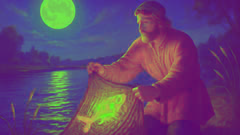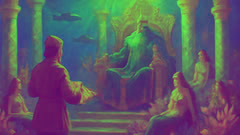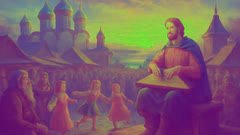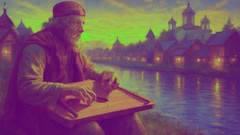Introduction
In the northern city of Novgorod, where the mighty Volkhov River cut a shining ribbon through the ancient landscape, life pulsed to the rhythm of trade, festivals, and the deep-rooted traditions of Russia’s medieval heart. Wooden houses huddled beneath onion-domed churches, and the city’s wide markets rang with the clangor of blacksmiths, the cries of merchants, and the laughter of children chasing each other between carts of fragrant rye bread and honey cakes. Yet, as dusk fell and the shadows lengthened across the river’s wide expanse, a different kind of music would sometimes float over the water—a sound not made for coins or applause, but for the soul itself. It was the gentle, mournful strumming of a gusli, plucked by Sadko, a poor but gifted musician whose life was about to change in ways he could never imagine. Though his clothes were patched and his boots worn thin, Sadko’s spirit was bright, and his hands could coax from his instrument the thunder of summer storms and the sighs of longing hearts. He played not only for the townsfolk but for the river itself, as if his music could reach the mysterious spirits said to dwell beneath its surface. Some claimed the river held secrets: that if a man played with true feeling, the waters might ripple with otherworldly voices. Few believed such tales. But Sadko, with his open heart and fearless fingers, would soon discover that legends sometimes listen—and answer. On the eve of a midsummer’s festival, as lanterns flickered and the city prepared for celebration, Sadko sat alone on the riverbank. His music carried into the twilight, weaving a melody of hope and yearning. Unbeknownst to him, his notes drifted deep into the currents below, awakening an ancient power. And so began a journey that would take Sadko far from the familiar stones of Novgorod—beneath the river, through realms no mortal eyes had seen, to the very throne of the Sea Tsar himself.
The Song that Stirred the Deep
Sadko’s days in Novgorod began like any others: rising with the sun, he’d join the early crowds in the market square, his gusli slung over his shoulder. The townsfolk welcomed his music, tossing a few copper kopeks into his cap as they bartered for smoked fish, woolen scarves, and barrels of honey. Yet, while merchants grew rich on bustling trade, Sadko remained poor, known more for his gentle nature than his fortune. But his music lingered long after the coins were spent, echoing through the narrow alleys and out across the water.

One evening, as the city’s festivities faded and the sky washed with indigo, Sadko returned to his favorite place: a solitary stone on the riverbank where reeds whispered secrets and willows trailed their long fingers into the current. He settled his gusli on his lap and played a melody that seemed to unravel the day’s worries. The notes danced across the water, merging with the river’s song. In that moment, a shimmering ripple disturbed the glassy surface. Sadko paused, heart pounding, but only the frogs and night birds answered.
He began to play again, this time letting his longing seep into every chord—the wish for something more than humble meals and fleeting coins, for a purpose beyond daily survival. The river responded. The current pulled at his feet, and a strange hush settled over the bank. A chill crept up his spine as the water swirled, and out from its depths arose a vision: silver scales glinting, eyes as deep as moonlit pools. The spirit of the Volkhov—ancient, watchful—listened to his song.
With trembling hands, Sadko finished his tune. In the silence that followed, the spirit spoke—not in words, but with a promise. "If you would know your fate, cast your net into these waters three nights running. Trust in your music, for it will open paths unseen." Then the vision faded, leaving Sadko awestruck, unsure if he’d dreamed.
The next day, curiosity warred with disbelief. Still, remembering the spirit’s words, Sadko borrowed an old net from a fisherman friend and returned each night to the bank. Twice he pulled up nothing but weeds and silt. On the third night, as the moon crowned the river, his net grew heavy. Drawing it in, Sadko gasped: he’d caught a golden fish, scales gleaming like coins in the moonlight. The fish stared at him with knowing eyes. Without thinking, Sadko released it back to the depths, sensing it was no ordinary catch.
From that day forward, luck seemed to find him. Merchants began to invite Sadko to play at their feasts, and his name spread across Novgorod. When he ventured into the market, nobles and commoners alike pressed coins into his hand. Soon, he had enough to buy fine clothes and even a small trading boat. Yet, as his fortunes grew, so did a restlessness within him—a sense that his journey was only beginning, that his true destiny still waited beneath the river’s surface.
The Bargain of the Sea Tsar
As spring painted Novgorod with wildflowers and sunlight, Sadko’s fortunes soared. He bought wares—fine furs, Baltic amber, woven cloth—and loaded his boat for trade along the great rivers. Yet, even as he sailed past pine-clad shores and bustling towns, the memory of the golden fish lingered. Sometimes, when he played his gusli beneath unfamiliar stars, the river would shimmer, as if listening.

One stormy afternoon, as Sadko returned from a distant voyage, the sky darkened without warning. The river churned with unnatural fury. His crew clung to the mast, eyes wide with fear, as a monstrous wave rose up—then split apart to reveal a figure both regal and terrifying. Cloaked in robes of seaweed and crowned with coral, the Sea Tsar himself emerged from the deep.
"Sadko, son of Novgorod," boomed the Sea Tsar, his voice echoing above the storm. "Your music has pleased my realm. But you owe me a debt—for the golden fish you returned was my messenger. Now, you must come to my kingdom beneath the waves."
Sadko’s heart raced. He saw terror in his crew’s faces, but he felt a strange compulsion—a pull as if the water called his very soul. With a prayer for protection, Sadko took up his gusli and leapt overboard. Instead of cold death, he felt a gentle current wrap around him, drawing him down through swirling green and blue.
He passed through forests of kelp taller than cathedral spires and meadows where silvery fish flashed like coins. Strange palaces of pearl and crystal rose from the sandy floor, guarded by armored sturgeons and shimmering mermaids. At last, Sadko stood before the Sea Tsar’s throne, surrounded by courtiers—some with human faces, others half-fish, half-dream. The Tsar’s eyes held the patience of ages.
"Play for us, Sadko," commanded the Sea Tsar. "Let your music fill my halls."
So Sadko played. The notes leapt and sparkled, casting light through shadowy water. As he played, the sea creatures danced—octopuses swirling, dolphins spinning, crabs clicking in time. The Tsar was pleased, and ordered feasts of sea-fruit and wine. For days—though time passed strangely—Sadko played for the Sea Tsar and his fantastical court.
But soon, Sadko noticed shadows behind the revelry. The Sea Tsar’s mood darkened. "I wish to wed my daughter," he declared. "Sadko, you must choose a bride from among my maids."
Sadko was shown a dazzling procession—mermaids with hair of gold, princesses with eyes like sapphires, noble maidens with voices sweeter than spring rain. Yet, as he gazed at them, he remembered Novgorod: the smell of baking bread, the laughter of friends, his mother’s warm embrace. He longed for the world above.
Desperate for guidance, Sadko remembered the river spirit’s words and prayed for wisdom. Suddenly, an old man—a saintly figure—appeared among the crowd and whispered: "Choose not for beauty, but for freedom. Look for the unremarkable, the one no one expects. Touch her hand, and you shall be saved."
When the time came, Sadko chose a quiet maiden at the end of the line—pale and silent, eyes downcast. As he touched her hand, the world spun. The Sea Tsar’s palace shook. The waters roared, but Sadko held tight. Light burst around him, and he felt himself rising through currents until he broke the surface, gasping for air, beneath the familiar sky of Novgorod.
Homecoming and the Wisdom of the Waters
Sadko awoke on the grassy bank where his journey had begun, the scent of river reeds filling his lungs. His gusli lay beside him, dry and unbroken. For a moment, he wondered if it had all been a dream. Yet, as he looked closer, tiny pearls gleamed in the folds of his tunic—a gift from the undersea realm.

News of Sadko’s disappearance had spread throughout Novgorod. When he returned, crowds gathered to hear his tale. He spoke not of treasure or conquest, but of strange realms and deeper truths: that ambition could tempt even the purest heart, but wisdom meant knowing when to return, when to seek balance between longing and contentment.
With his newfound wealth and fame, Sadko could have lived as a lord. Yet he chose a quieter path. He rebuilt his mother’s cottage, shared his riches with the poor, and continued to play for the city—not for gold or glory, but for the joy of music and the comfort it brought to others. His melodies grew richer, laced with memories of currents and corals, sorrow and joy.
On festival nights, as lanterns shone and dancers circled under starlight, Sadko’s music brought people together—nobles and peasants, traders and travelers. Some swore that when he played near the river, the water would ripple in time with his song, and mysterious shapes could be glimpsed beneath the surface. Children learned to listen for the whispers of the deep, and old tales gained new life.
Years passed. Sadko grew older, his hair silvering like frost on morning grass. But he never lost the wonder he’d found beneath the waves. He taught young musicians not only notes and chords, but the importance of listening—to others, to nature, to the quiet stirrings of fate. And in this way, the legend of Sadko lived on: not only as a tale of adventure, but as a lesson in humility, courage, and the wisdom of returning home.
Conclusion
The legend of Sadko endures across centuries, woven into the soul of Russia itself. His journey from humble musician to guest of the Sea Tsar is more than a tale of magic; it’s a reminder that fortune alone can’t fulfill the human heart. Sadko’s greatest gift wasn’t gold or pearls, but wisdom—earned by risking everything for music, by choosing compassion over temptation, and by embracing the bittersweet joy of returning home. His story invites us to listen: not only to the world’s clamor, but to the quiet songs beneath its surface—the voices of longing, gratitude, and hope that shape our lives. As long as rivers flow past ancient cities, and as long as music can bridge worlds seen and unseen, the spirit of Sadko will echo in every heart that dares to dream and every hand that reaches out in kindness.













